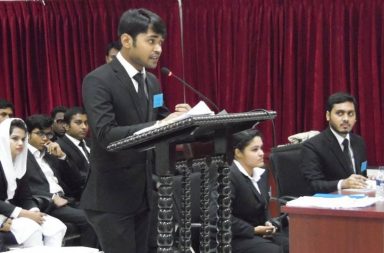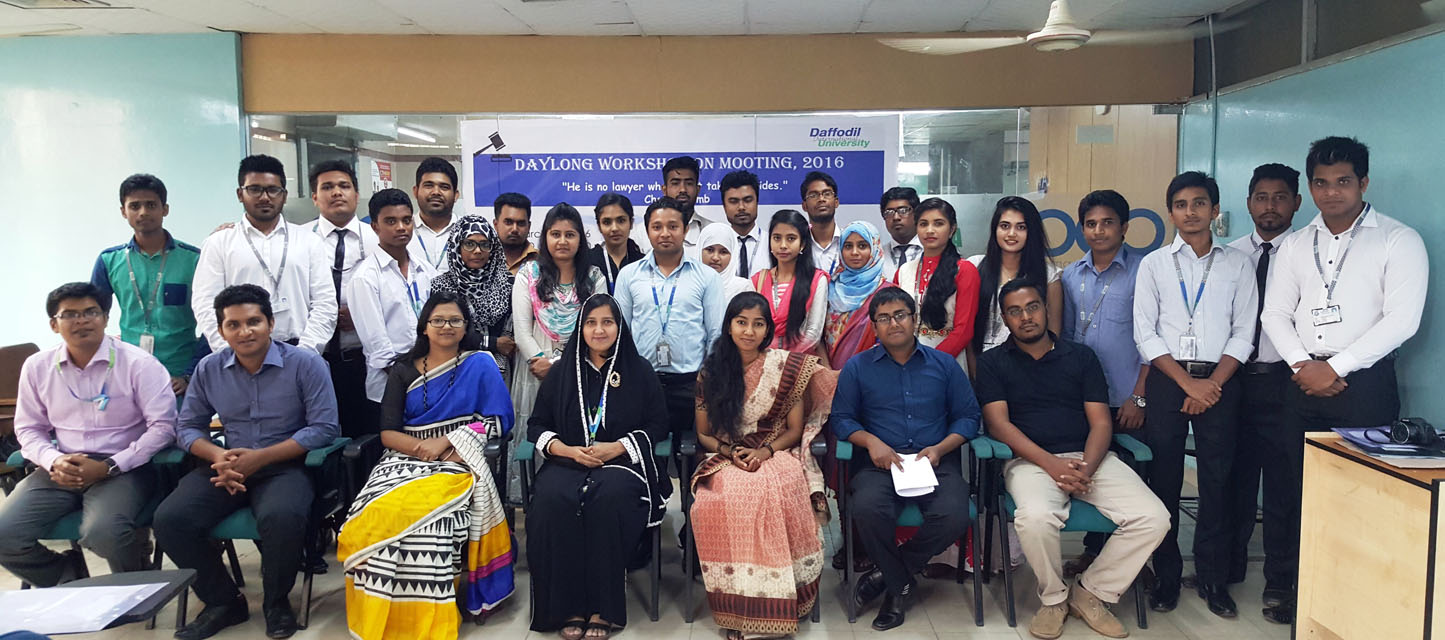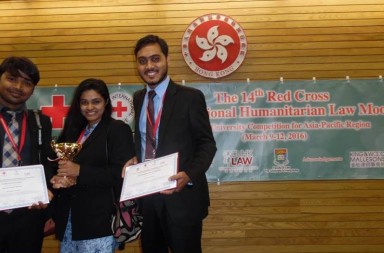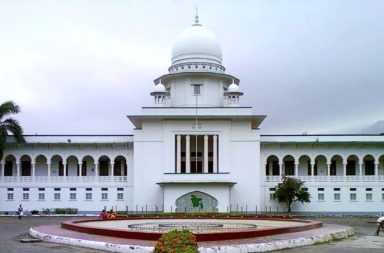By Zeeshaan Hashmi
The Henry Dunant Moot Court Competition is one of the best opportunities available to law students in South Asia. Any moot court gives students the opportunity to put their advocacy, research and drafting skills to the test, but the great thing about the Henry Dunant moot is that it provides a platform to the crème de la crème of South Asia’s law students to interact with and learn from eminent jurists who serve as Judges of the competition; as well as from each other.
My journey began with my team winning the Pakistan National Round of the Henry Dunant moot in Islamabad. In Islamabad, we were so focused on doing well in the National Round that we had no idea what would happen if we won. So it came as a surprise to us that as the winning team, we were to represent Pakistan in Bangladesh. The National Round had proved helpful in introducing us to international humanitarian law and international criminal law; which none of us have studied formally on our LLB. We knew, however, that any mistakes we had made in the National Round could not be repeated in Dhaka as we would be facing the national champions of India, Sri Lanka, Nepal, Iran and the host country Bangladesh.
We endeavored to get our hands on the moot problem for the Dhaka Competition as soon as possible so we could begin the long and grueling research that is a part and parcel of the moot court experience. However, when we received the moot problem we were in for a shock; all the other teams participating in Dhaka were using the same moot problem involving genocide and wilful killing in their National Rounds, whereas we were given a different problem involving deprivation of fair trial, forcible transfer of civilians and perfidy in our National Round. This meant that the assertions and observations of the other teams in Dhaka would have been subject to judicial scrutiny; in light of which those teams would have improved and honed their arguments for the Regional Competition. We realized that in view of this great disadvantage our only option was to redouble our efforts in preparation for the Dhaka Competition.
Thus began a series of many sleepless nights spent reading up on commentaries of international humanitarian law and international criminal law as well as trying to make sense of the voluminous judgements of Courts such as the ICC, ICJ, ICTY and ICTR. Eventually the memorial was submitted, the research completed, and the time to fly to Dhaka had come. After a long and tiring flight where we were bound in the opposite direction to Dubai and then had to fly all the way to Dhaka, we reached the BRAC Inn at 8:30 pm; leaving us with barely enough time to check in, have dinner and then go over our oral arguments.
One more sleepless night preceded our encounters against Sri Lanka and India in the preliminary rounds of the competition. Our first match was against Sri Lanka and already we could tell that the standard of competition was much higher than Islamabad; it was evident that we were facing a champion team. We kept our cool and stuck to the basics; which was a formula that we repeated in our second match against India. At the results announcement on the first day we were overjoyed to hear that our team along with Iran, India and Nepal had made it to the semi-finals. That only meant that we needed to stay up one more night to hone our oral arguments! Before that, however, we got some time to let our hair down at a dinner hosted by the ICRC; and that was when we made friends with the teams from Iran and Sri Lanka and got to know the organizers of the competition better.
The next day we had probably our toughest match of the competition against Iran first up in the semi-finals. The panel asked a series of difficult questions which both sides struggled with. In our second semi-final against Nepal we came across a very different panel that allowed us to go into greater detail in our arguments with questions being asked sparingly. The results of the semi-finals were announced soon after the matches ended and we were ecstatic to find out that we had reached the final round against India; which meant that we had qualified for the Asia-Pacific Competition to be held in Hong Kong. We had a tough match with India which seemed like it could go either way; but in the end, the better team won, with us bagging the runners-up title. The Best Mooter award was a great bonus, so in the end we were rather happy when we went home.
On a personal note, I regret that the competition was so hectic that we got absolutely no time to explore Dhaka as tourists. And, I am constrained to say that I found Bangladeshi hospitality a tad disappointing. In Pakistan we hear so much about how Bengali mithai, particularly russ gullay, are the best in the world. We have a chain of shops called “Dhaka Sweet House” in Karachi and Islamabad, so I was looking forward to sampling authentic Bengali mithai on my trip to Dhaka. Alas, we could not buy any mithai due to the lack of time and neither was any offered to us.
In any event, despite going into the competition with the odds against us, we had managed to qualify for the Asia-Pacific Competition and we got the most prestigious individual award as well. Also, we made friends and interacted with people from across the region; providing for an overall enriching experience. Most important of all, we learned that our level of preparation and argument was good enough to stand up to judges of international renown; with Justices of the Supreme Courts of Bangladesh and Sri Lanka judging us in the semi-final and final rounds.
The competition greatly influenced my career path as well. I wanted to pursue a Bar-at-law from England at great expense to my parents prior to the competition. On the way back, I realized that there was nothing that an expensive Bar-at-law degree could teach me that I had not learned in grueling moot court experiences. The delegations at the competition were also in awe of the activism of the Supreme Court of Pakistan. In the wake of witnessing the international renown of the Supreme Court, I applied to be a law clerk at the Court, and got the opportunity to clerk for both the Chief Justice and Senior Puisne Judge. At the end, I again encourage all law students across South Asia to actively pursue moot court and particularly the Henry Dunant Moot. The experiences you have will stay with you for life.
___________________________
Zeeshaan Hashmi is pursuing his LL.M from Harvard Law School. He worked at Aseem Hafeez and Associates, and also worked as a Law Clerk under the Chief Justice of the Supreme Court of Pakistan. He won the Best Mooter award of Henry Dunant Regional Moot Court Competition, 2012.



